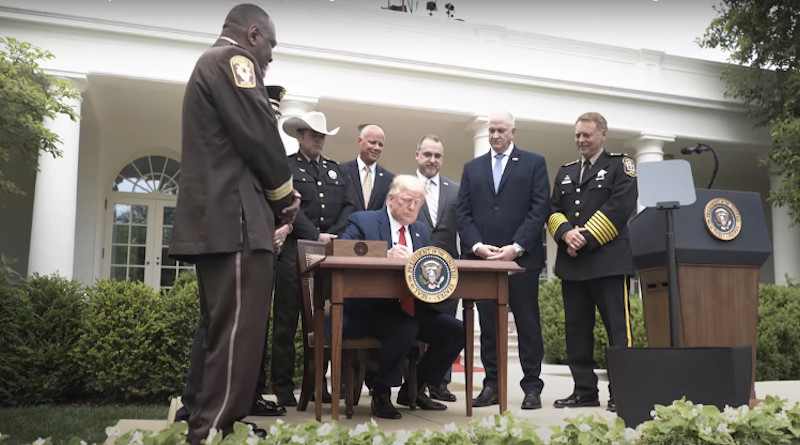Trump Signs Executive Order on Police Reform
By VOA
By Steve Herman
Amid sustained nationwide street protests, U.S. President Donald Trump on Tuesday signed an executive order outlining some police reforms.
“Reducing crime and raising standards are not opposite goals,” Trump said in the White House Rose Garden before signing the document, titled “Safe Policing for Safe Communities.”
The order will encourage “police departments nationwide to adopt the highest professional standards to serve their communities. These standards will be as high and as strong as there is on Earth,” said the president.
The measure also calls for certification bodies to train officers on de-escalation techniques and use of force standards.
Another part of the order pushes for creating so-called co-respondent services, a system in which officers would pair with social workers when responding to nonviolent calls, by directing “federal funding to support officers in dealing with homeless individuals, and those who have mental illness and substance abuse problems,” said Trump. “We will provide more resources for co responders, such as social workers who can help officers manage these complex encounters.”
Trump did not address the linkage of systemic racism to police brutality, an issue cited by demonstrators across the country.
“The president’s weak executive order falls sadly and seriously short of what is required to combat the epidemic of racial injustice and police brutality that is murdering hundreds of Black Americans,” said House Speaker Nancy Pelosi in a statement, contending it “lacks meaningful, mandatory accountability measures to end misconduct. During this moment of national anguish, we must insist on bold change, not meekly surrender to the bare minimum.”
U.S. opinion polls show there are widespread concerns among the public about brutal responses by law enforcement.
Trump administration officials have rejected the narrative that American law enforcement is endemically racist.
“Americans want law and order,” said the president during his remarks Tuesday. “They demand law and order.”
Before the Rose Garden event, Trump met with families of some of those who lost loved ones in deadly interactions with police.
“Your loved ones will not have died in vain,” said Trump in his remarks before signing the order. “I cannot imagine your pain or the depth of your anguish, but I will fight for justice.”
More sweeping overhauls to the nation’s policing are under consideration in Congress.
Proposals for police reforms come after three weeks of nationwide protests renewed by the death in police custody of George Floyd, an African American man who died in Minneapolis, Minnesota, after an officer knelt on his neck for nearly nine minutes.
Floyd’s was the latest case to spark outrage at the use of force by police, especially against African Americans. Last Friday brought another with police shooting dead Rayshard Brooks in Atlanta.
The Senate Judiciary Committee held a hearing on the issue Tuesday with testimony from law enforcement and civil rights officials.
The chamber’s Republican majority is crafting its package of proposals, which includes a ban on chokeholds and increased used of police body cameras.
Senate Majority Leader Mitch McConnell called the legislation “a serious proposal to reform law enforcement.”
Senate Minority Leader Chuck Schumer said the Republican effort does not go far enough.
“While the president has finally acknowledged the need for policing reform, one modest executive order will not make up for his years of inflammatory rhetoric and policies designed to roll back the progress made in previous years,” said Schumer.
“Unfortunately, this executive order will not deliver the comprehensive meaningful change and accountability in our nation’s police departments that Americans are demanding,” the Democratic lawmaker added. “Congress needs to quickly pass strong and bold legislation with provisions that makes it easier to hold police officers accountable for abuses, and President Trump must commit to signing it into law.”
The Democrat-led House of Representatives is expected to vote sometime this month on its own package that includes a contentious provision that would make it easier to file civil lawsuits against officers.
Trump is standing by what is known as the qualified immunity doctrine. The doctrine protects law enforcement officers from lawsuits unless it can be proven they violated clearly established statutory or constitutional rights of which a reasonable person would have known.

